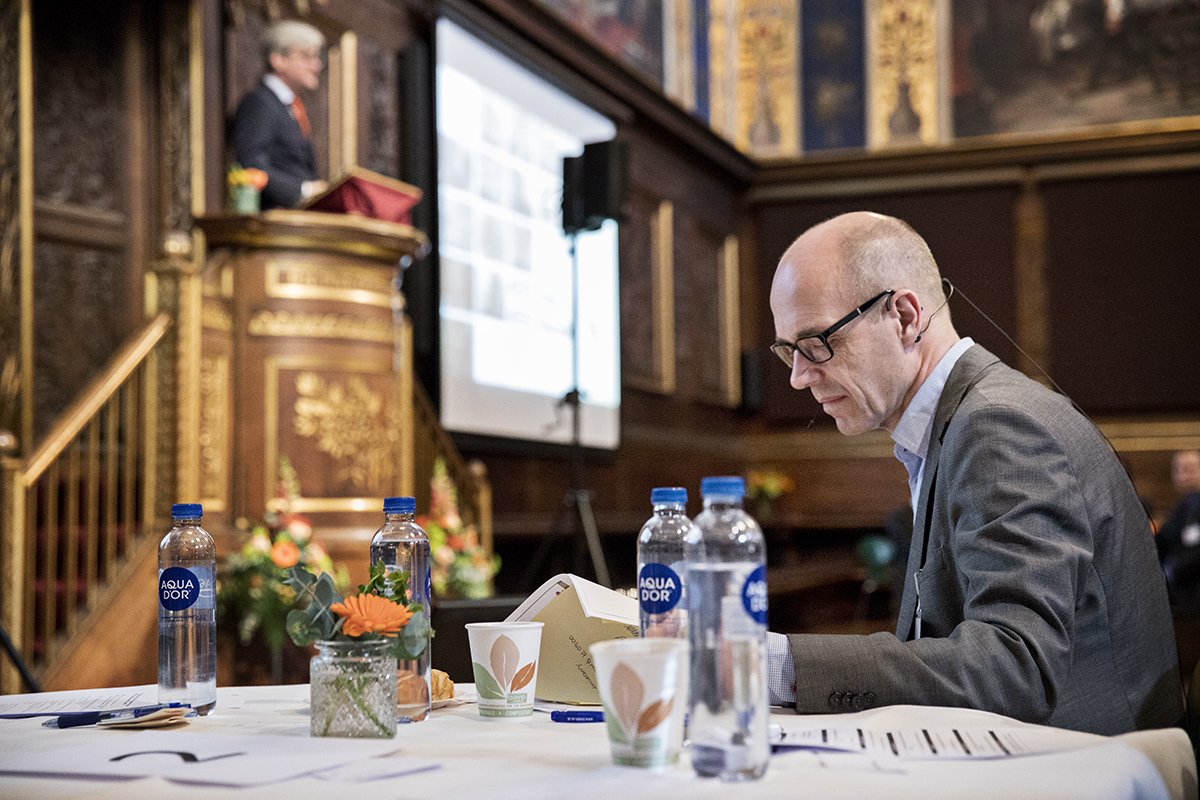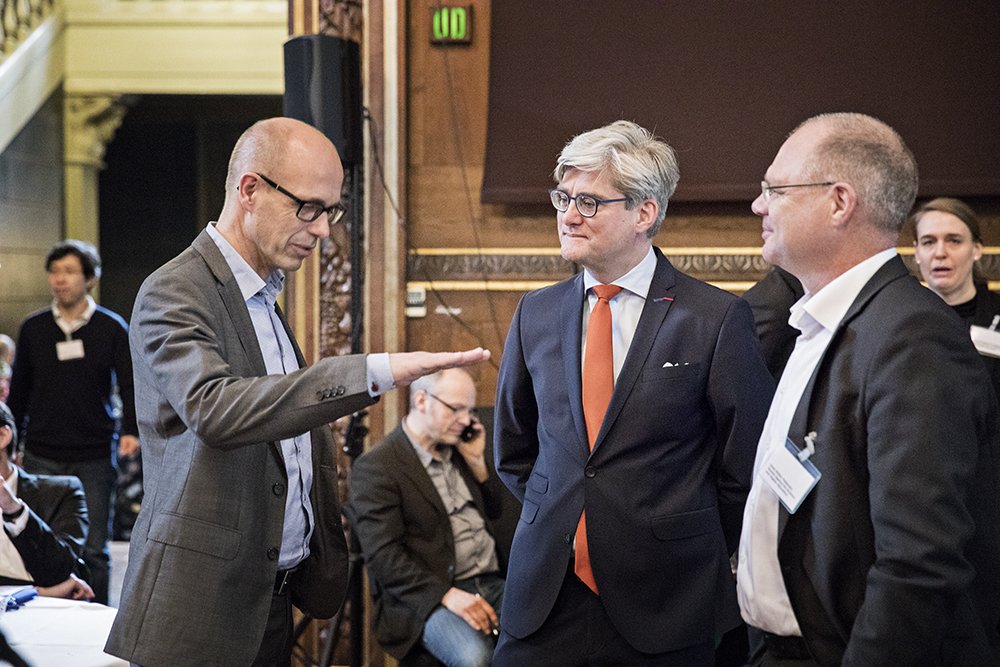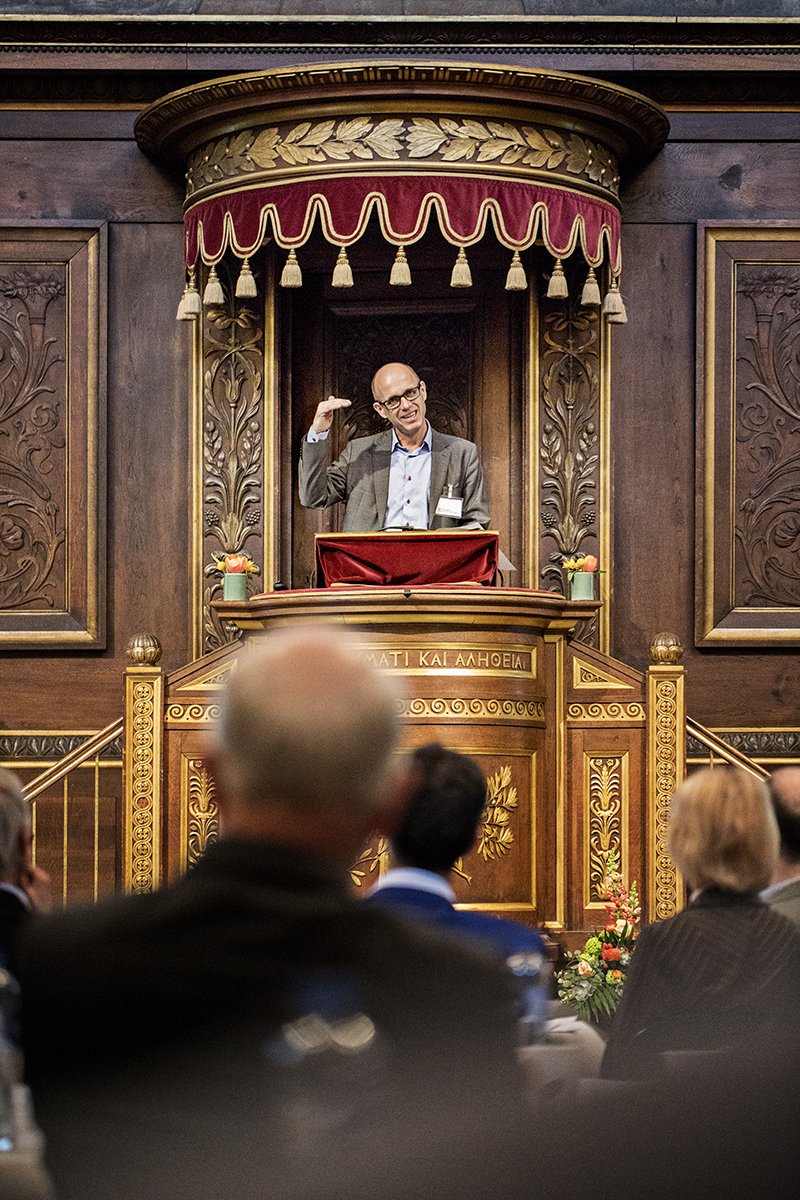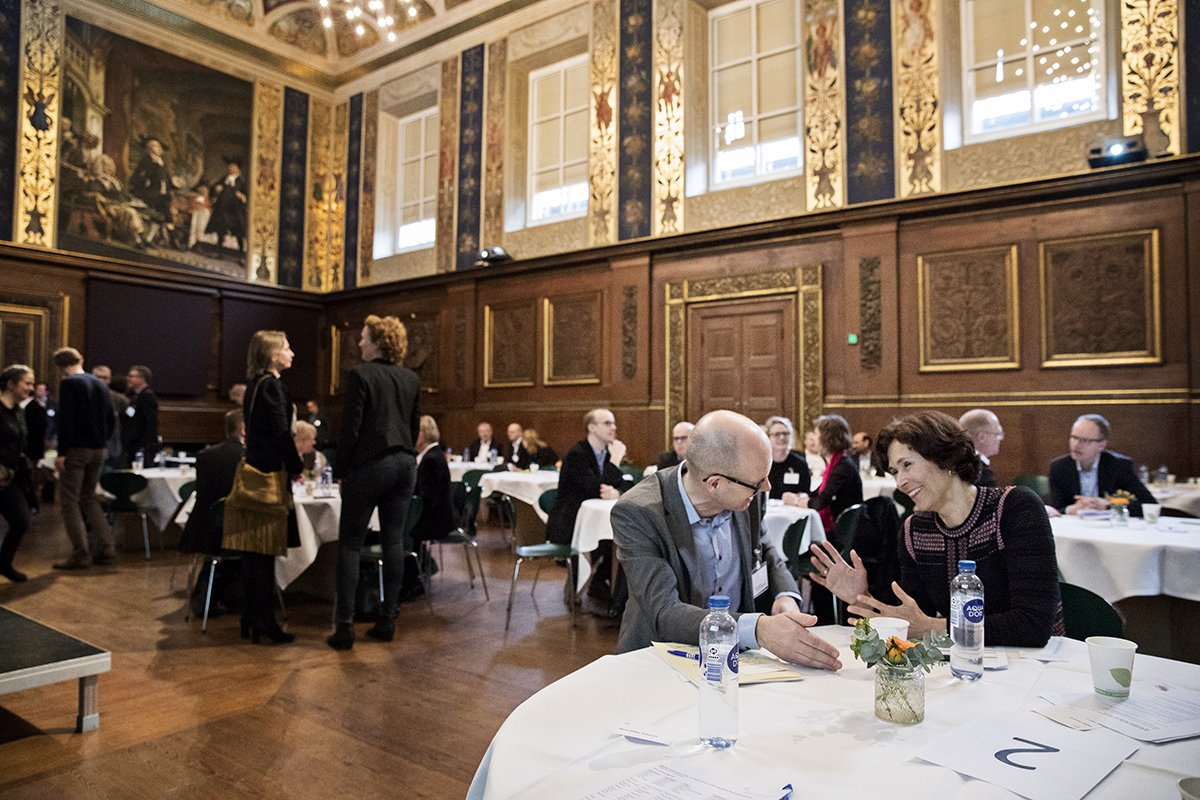Universitetsavisen
Nørregade 10
1165 København K
Tlf: 35 32 28 98 (mon-thurs)
E-mail: uni-avis@adm.ku.dk
—
Campus
We were allowed to shadow the University of Copenhagen's new rector on an ordinary working day. He was busy. Also busy sitting still.
For soldiers at the bottom of the pecking order, the day is a long series of abrupt starts and stops. The grunts are always busy, even if they do not have to do anything because other people are always controlling their time spent. But the funny thing is that the same also applies to the generals.
Take the University of Copenhagen’s new rector, who you can see jumping out of his office just around 9 o’clock on a Thursday morning, just so he can be a bit late for an event, where he has to sit still for almost three hours.
A little earlier in the morning in his big yellow office on Nørregade street, Henrik Wegener worked through a desktop tray of A4 sheets and upheld decisions with a signature. Some of the papers are diplomas and stuff, but there are also documents with far-reaching consequences for UCPH. Wegener reels off the signatures without breaking a sweat.
The strategy is in fact the Board’s job description for me.
Henrik Wegener
“All this has been thoroughly quality-assured,” he says, glancing at the small yellow post-its which specify who in UCPH deep management has ‘pre-chewed’ through the content of each document. The signature session is a regular morning routine and it takes no more than 10 minutes.
Afterwards, Henrik Wegener has set off 20 minutes for one of a series of meetings on a comprehensive new strategy for UCPH. It will – like the document which it replaces – be the ‘frame and direction’ and ‘common compass needle’ for the university. The strategy is also a political statement about what the country’s largest university would like to focus on and how it is to be marketed to students and researchers. The Board of Directors and the rectorate have been away on a workshop for a few days to brainstorm on what the document should contain, and now it’s rector’s job to summarise the flow of ideas.
Apart from the noble and fluffy ambitions (like making the education programmes for the UCPH students better, as it says in the current, soon to be outdated strategy), the new strategy will contain some specific benchmarks.
When Henrik Wegener took office, he inherited an experienced directors group and a team of combat-experienced deans, who all have contracts way out into the future, so he does not have the option of starting from afresh and setting up a team that shares his attitude and that has accepted his plans. In contrast to this, the new strategy will enable the rector to influence the goals that he would like to be judged by ‘in the next one per cent of the UCPH lifespan’. It is these things that will define his term in the chair.
“The strategy is in fact the Board’s job description to me,” says Henrik Wegener. A senior partner from the consulting firm Implement is assisting UCPH in hammering out a strategy. His job, he says, is to challenge the other managers, so they avoid thinking up something too quickly and too easily.
In the Ceremonial Hall something like 100 people are gathered at round tables. All have got water, all have got coffee, all have finished their croissants.
The guests are waiting here because UCPH is the venue for the celebration of the European Research Council’s (ERC) 10-year anniversary. They are a variety of the world’s top brass in the education world and the successful researchers who have fought their way to money from the large joint European pile of cash. Permanent Secretary of the Ministry for Higher Education – or as she calls it the Ministry of Magic – Agnete Gersing, is standing up and speaking.
Wegener is the last guest. He affixes his tall figure to a small green chair, just in time to pick up some words and to nod approvingly.
We might as well tell it like it is: The ERC anniversary is, considered as a celebration, a very, very dull party. All the participants are at work. The speeches are long and the crowd moves in their chairs like passengers on a packed flight. In between, there are films where people sing the praises of the Research Council and the effect of the many millions of kroner it awards to research. But the participants at today’s meeting are well aware that research is super.
If it was all doom and gloom and sadness, you wouldn’t work your butts off, pardon my French.
Henrik Wegener
The University Post can hide in the back, with a screen and a notepad for recreation, but Henrik Wegener has to sit in the middle of the room in the three hours that the session lasts, while everyone can see if he is focused.
Later he says that he can understand that he should be present.
“ERC has a special standing. Especially for a university that wants to brand itself as one of the foremost in Europe. So this calls for more top management attention, or whatever you want to call it.”
“But under many different circumstances, I think my job is to welcome people. And besides, I have a mantra, that if I am in this kind of situation, it is about not sitting down and vegetating, but trying to find out how I can create value for UCPH while I’m there. So it is not just small talk, but actually trying to get something out of the time that creates the value. ”
When the break comes, the room explodes in researcher talk. Henrik Wegener leans toward the permanent secretary. He gesticulates and makes for a small confidential space with his palms. Afterwards he will not say what they were talking about. The Minister for Higher Education and Research joins them and munches on a piece of pastry.
“The minister asked me to be funny,” the rector said in English, when it was his turn to make a speech, and he followed it up with some considerations that research is fun to carry out. “If it was all doom and gloom and sadness, you would not work your butts off, pardon my French,” he says.
In his speech, Wegener admits that Danish rectors tend to measure their respective institutions’ status by the number of ERC grants they have received. As one thing is to be skilled in Denmark, quite another to compete for funds with the best from all the other big countries.
And UCPH is comfortable as one of the universities that grabs many of the grants. Not least, according to Henrik Wegener, because the UCPH administrators have been really good at helping researchers write applications that achieve support.
“I know that many researchers would like a university without administration. I would like to challenge this,” he says.
After the last speaker has attempted to strike the fatal blow just a little before noon, there are fancy titbits, white wine and classical guitar music. A queue forms at the buffet, but Henrik Wegener flees back to his office and regains control of his day.
12:30 pm and the University Post is let in. It is the ‘joint chiefs of staff’ at UCPH that we meet; the core of that assembly of people they call “Nørregade” [the name of the street, ed.] out in the faculties. And it smells like school – packed lunch – because Wegener just had to swallow his lunch at the office.
Jesper Olesen, the university director, and Jasper Steen Winkel, deputy director for UCPH communication and Steen Ulrich, deputy director for the rector secretariat, are the permanent class members. The same goes for the prorectors (although there is only one present today). The other deputy directors or deans enter in turn. They sit and wait outside the door until it is their turn.
One of the topics is a recent study of Danish PhD students which proves them to be good. Perhaps also better than their reputation, as for some years there has been criticism that Denmark was training too many researchers and that it was scraping the bottom of the barrel in selecting new PhD students.
Henrik Wegener calls the study “good news for UCPH,” and his prorector for research, Thomas Bjørnholm, agrees. He says it would be bad for the University of Copenhagen to reduce the PhD programmes. “Then our value will drop in the research stock market,” he says.
“It is the PhD’s who are doing a lot of the research today,” says Henrik Wegener. “If you pull out the PhD’s, the professors will have to put their lab coats back on.”
But PhDs are expensive, says the communications deputy director, referring to the fact that UCPH needs to trim its finances.
Yes, says Wegener. “But it’s also the good conditions for PhDs in Denmark, that let us attract the best. It is here that we are leading in salaries,” he says (professors and associate professors do not get a huge salary in Denmark compared with other countries, and they don’t have good job security, ed.).
“Are there any hidden flaws and blemishes behind this story?” Wegener wants to know, and there is. Many of the new PhDs have to find jobs in the private sector in the future, because they cannot all be in academia.
“We have a responsibility for the companies seeing the light,” says Prorector Thomas Bjørnholm. “It is in our interest that the PhD’s get a job – even in the private sector.” He suggests courses where companies get their problems solved by PhD students, so they can see what a research-trained person can accomplish.
It’s hard to overlook the fact that university management has been infected by the Danish fad for cakes. Their talk is, metaphorically, of “baking cases together” to single points, and of observations that are even “baked into” in future talks.
If UCPH was a cake, it could be described as a layer cake with at least three layers. More layers than Henrik Wegener is used to in the more compact Technical University of Denmark (DTU) where they, for instance, have not burdened the organization chart with faculties (like a Mazarin cake, if you will).
“We have built in more diversity here, so I need to understand that things are more complex,” says Henrik Wegener.
“I need to understand what the meaning of the cases are in the EU, not only in Denmark if you have to translate it into something geographical. I need to be able to listen more than I’ve been used to, because things are not as homogenous – and take care not to make up my mind too quickly. ”
The meeting takes up most of the afternoon. Every time a particularly juicy topic is on the agenda, the University Post is booted out into the hallway to the stream of waiting deputy directors.
Anni Søborg, deputy director for education services makes her report. She says the university has miscalculated by DKK 48 million in their prediction on how many students will take exams and trigger the money from the treasury. Three of the faculties have been overly optimistic.
“Can anyone help this poor functionary understand why you can be so far off the mark?” asks Wegener and he gets some suggestions that are mostly about the Danish Study Progress Reform and the changes that have made it difficult to figure out how students would behave. In some places they have gone on more leave than expected, in other places, they have understood immediately to take advantage of the fact that the rules have been made more lenient.
“This is a beautiful example of over-regulation and the consequences of it,” says Henrik Wegener.
It is striking – just from the cases that we are allowed to listen in on – that the UCPH managers think and act as politically. A few days later Henrik Wegener said to the University Post that things should be no different:
I promise you that a discussion of the political conditions takes place in all public enterprises and it would be wrong for them to just stand to attention and accept decisions that they themselves find problematic.
Henrik Wegener
“We are a part of society, and the public sector, and the public sector is subject to conditions defined by the government and its supporting parties. But when governments come and go, the framework changes too. And this means that you often have to try to understand the significance of the political decisions, and in fact also the political processes that lead to the decisions. We need a regular progress report on what’s coming, whether it is of greater or lesser importance, and whether it can be influenced. ”
Wegener’s trade off
DTU (Technical University of Denmark)
Students / employees: 9,000 / 6,000
Annual budget: DKK 4.9 billion.
Buildings: Freehold
External funding: Approximately DKK 1.6bn.
Equity capital: Approximately DKK 2.3bn.
PhD students: 407 enrollments (2015)
Ranking: Times Higher Education no. 176
UCPH (University of Copenhagen)
Students / employees: 40,000 / 10,000
Annual budget: DKK 8.4bn.
Buildings: Rents its buildings from the state
External funding: Approximately DKK 2.7bn.
Equity capital: Approximately DKK 1.5bn.
PhD students: 867 enrollments (2015)
Ranking: Times Higher Education No. 120
One of the most politicized issues in recent years has been the University of Copenhagen’s building ownership.
The rectorate under former rector Ralf Hemmingsen and the Board have at times – and unsuccessfully – wrestled with the Danish Building and Property Agency and its supervising ministry for the rights to own the university buildings and the power over the billion kroner construction projects that have been transforming the campus areas in recent years. It states in the Universities Act, that universities may own their buildings. But the Danish government has so far refused to negotiate a sale, possibly because the current rent is so high that it pulls back some of the funding to UCPH to the Treasury.
One of the building projects is the subject of the rector’s last scheduled meeting this Thursday.”It is a complicated matter, and the university is not thrilled by the progress on it,” says Henrik Wegener.
It has turned out that the chemists’ and physicists’ new 50,000 square meters Niels Bohr Building will be delayed at least a year, and it’s going to cost. The responsibility for managing the buildings is the Danish Building and Property Agency’s. But it is the university that has to pay any extra rent bills. A main contractor has been fired by the agency with a legal dispute to come, and it is uncertain who is to take over and what the new building is lacking. Researchers and students are waiting in uncertainty, plans have gone down the drain. But the rector cannot give them a clear message. At present, he must make do with a status.
This is not to say how UCPH will behave under Henrik Wegener’s management. He seems to be on good terms with the top officials at the Ministry of Magic, but he also says that UCPH will not stand to attention and blindly accept the political agenda.
“I promise you that a discussion of the political conditions takes place in all public enterprises and it would be wrong for them to just stand to attention and accept decisions that they themselves find problematic. Here you will, as management, always ask for a dialogue in an attempt to get your views seen, heard, and understood – so the politicians who make the decisions know something about their consequences,” he says.



